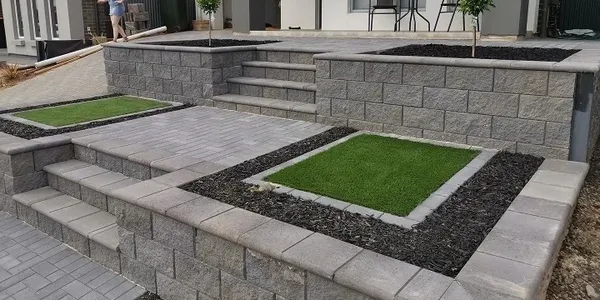When it comes to landscaping and property management, one aspect that often goes overlooked but is of immense importance is retaining walls. These structural elements not only serve a practical purpose in preventing soil erosion and managing landscapes but can also enhance the aesthetic appeal of your property. However, to ensure that you get the best results, it’s crucial to find reliable local retaining wall contractors who understand your specific needs and the unique challenges of your area.
In this comprehensive guide, we’ll explore the world of retaining walls, why they matter, and the essential steps to finding the best local retaining wall contractors in your area.
Why Retaining Walls Matter
Before we dive into the process of finding the right contractor, let’s first understand why retaining walls are essential for your property.
- Soil Erosion Control: Retaining walls are designed to hold back soil and prevent it from eroding, especially on sloped landscapes. This is vital for maintaining the stability of your property.
- Aesthetic Appeal: Retaining walls come in various materials and designs, making them not just functional but also an attractive addition to your landscape. They can create terraced gardens or add definition to your outdoor space.
- Property Value: Well-designed retaining walls can significantly increase the value of your property, making them an excellent investment for homeowners.
Now that we understand the importance of retaining walls, let’s explore the crucial steps to finding the best local contractors.
Factors to Consider When Hiring Retaining Wall Contractors
When it comes to retaining walls, hiring local expertise is of paramount importance. Local contractors understand the specific needs and challenges of your area, including soil types, weather conditions, and any local regulations. Here are some key factors to consider when choosing a contractor:
- Local Expertise: Local contractors have experience working with the unique characteristics of your area. They know the soil types, weather patterns, and local regulations that can affect your retaining wall project.
- Proper Licensing and Insurance: Always check if the contractor has the necessary licenses and insurance. This ensures that you are working with a legitimate and responsible professional.
- Experience and Track Record: Consider contractors with a proven track record. Ask for examples of their previous work to assess the quality of their craftsmanship.
- Client Reviews and Testimonials: Online review websites and word-of-mouth recommendations can provide valuable insights into a contractor’s reputation. Look for positive reviews and testimonials from previous clients.
Researching Local Contractors
The first step in your journey to finding the best local retaining wall contractor is conducting thorough research.
- Ask for Recommendations: Start by asking friends, family, and neighbors for recommendations. They may have had similar projects and can provide insights into the contractors they worked with.
- Online Directories and Review Websites: Use online directories and review websites to find local retaining wall contractors. Websites like Yelp, Google My Business, and the Better Business Bureau can be helpful.
- Social Media: Many contractors have a presence on social media platforms. Check out their pages and look for images of their previous projects. This can give you a sense of their style and work quality.
Interviewing Prospective Contractors
Once you’ve compiled a list of prospective contractors, it’s time to set up interviews. These interviews are crucial for assessing a contractor’s suitability for your project. Here are some questions to ask:
- Project Specifics: Discuss the details of your project, including the size of the retaining wall, the materials you’d like to use, and any specific design preferences.
- Timelines: Inquire about the estimated timeline for the project. Ensure that it aligns with your expectations.
- Pricing: Discuss pricing and payment structures. Make sure there are no hidden fees or surprises.
- References: Request references from previous clients and follow up with them to inquire about their experience.
Checking References and Previous Work
Checking references is a critical step in the hiring process. Contact the provided references and ask them about their experience with the contractor. In addition to references, inspect the contractor’s previous work to assess the quality of their craftsmanship. Look for the following:
- Quality of Work: Examine the craftsmanship of their previous retaining wall projects. Pay attention to details, such as the straightness of the wall and the quality of the materials used.
- Durability: Check if the walls they’ve built have stood the test of time. A well-built retaining wall should last for many years.
- Communication: Inquire about the contractor’s communication skills and responsiveness. Effective communication is crucial for a successful project.
Licensing, Permits, and Insurance
Understanding the legal aspects of your retaining wall project is essential. Here’s what you need to know:
- Permits and Approvals: Many retaining wall projects require permits and approvals from local authorities. Make sure your contractor is well-versed in obtaining these permissions.
- Licensing: Ensure that your contractor holds the necessary licenses to operate in your area. Licensing requirements can vary, so check with your local government.
- Insurance: Confirm that the contractor has insurance coverage. This protects you in case of accidents or property damage during the project.
Estimating Costs and Budgeting
Retaining wall projects can vary significantly in cost. To budget effectively, consider the following:
- Project Size and Complexity: Larger and more complex retaining walls will naturally cost more. Discuss the specific requirements of your project with your contractor.
- Materials: The choice of materials, such as concrete, stone, or timber, can impact costs. High-quality materials often come with a higher price tag.
- Labor: Labor costs can vary depending on the experience of the contractor and their crew. Consider this when budgeting.
- Additional Features: If your project involves additional features, such as drainage systems or lighting, factor these into your budget.
Timeline and Project Planning
The timeline of your retaining wall project is essential. Here’s how to plan for a successful project:
- Realistic Expectations: Work with your contractor to establish a realistic timeline. Consider potential delays due to weather conditions or unforeseen challenges.
- Phases of the Project: Discuss how the project will be divided into phases. This can help you understand the progress of the work.
- Coordination: Ensure that the project is well-coordinated, and all parties involved are on the same page.
Contracts and Legal Considerations
A written contract is essential for any construction project. Make sure your contract includes the following:
- Scope of Work: A detailed description of the work to be done, including materials and design specifications.
- Timeline: The project timeline, including start and end dates.
- Payment Schedule: A clear payment schedule, detailing when and how payments will be made.
- Warranty: Any warranties or guarantees should be clearly outlined in the contract.
Tips for a Successful Project
Lastly, here are some tips to ensure your retaining wall project runs smoothly:
- Regular Inspections: Regularly inspect the progress of the project to catch any issues early.
- Communication: Maintain open and effective communication with your contractor throughout the project.
- Problem-Solving: Be prepared to address any challenges or unexpected issues that may arise during the project.
In conclusion, finding the best local retaining wall contractor involves thorough research, interviews, and due diligence. By following these steps and considering the local expertise, licensing, insurance, and track record of contractors, you can ensure that your retaining wall project is in safe and capable hands. Invest in the right contractor, and you’ll enjoy a functional and aesthetically pleasing addition to your property that will stand the test of time.







